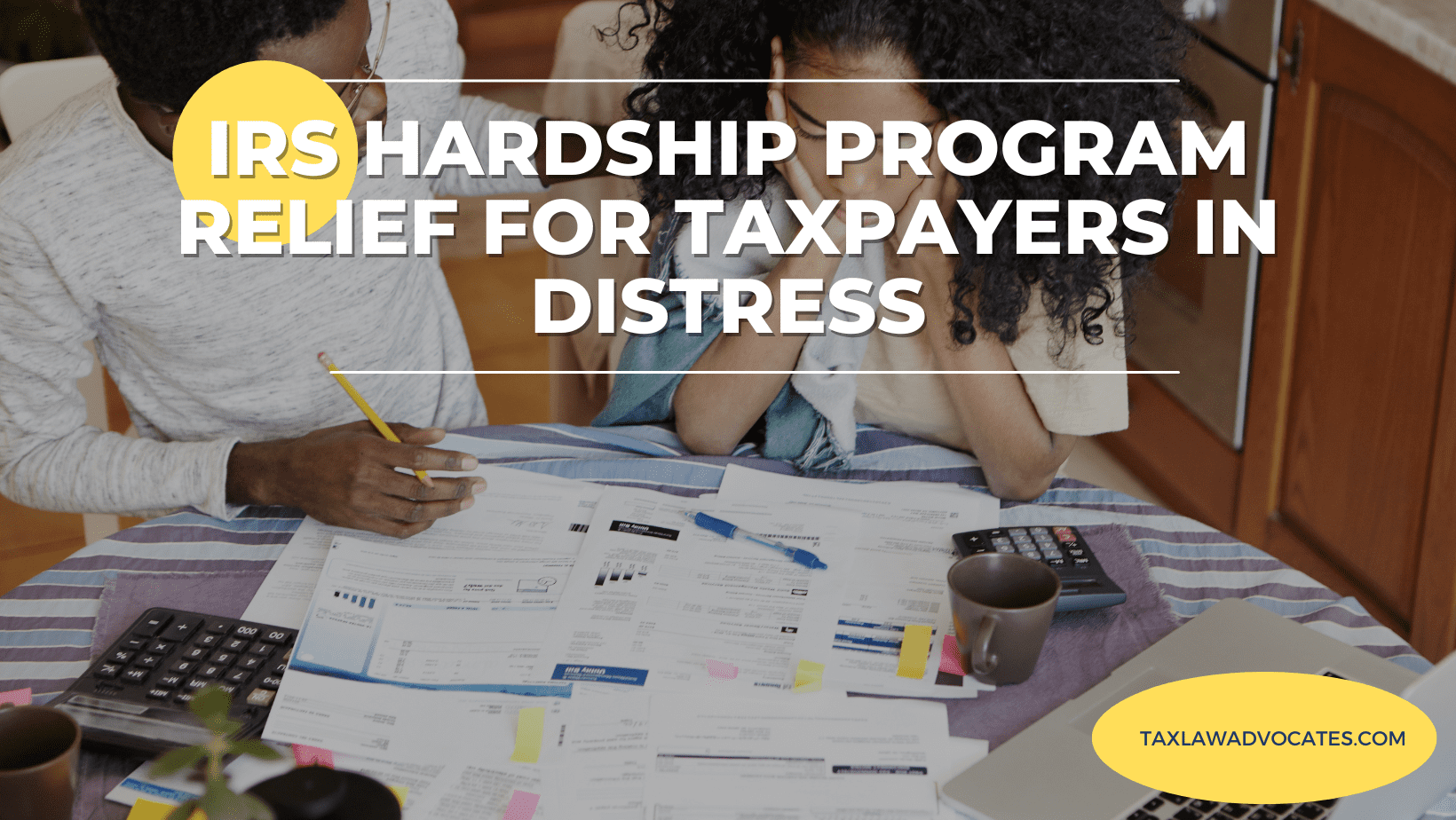If you’re overwhelmed by IRS debt and struggling to cover basic living expenses, the IRS Hardship Program—officially known as Currently Not Collectible (CNC) status—may be the relief you need. This program allows eligible taxpayers to pause collection actions like wage garnishments and bank levies if they can prove financial hardship. But getting approved isn’t automatic, and the process requires a thorough understanding of what the IRS looks for.
At Tax Law Advocates, we specialize in helping individuals and families obtain IRS hardship relief and protect themselves from aggressive collection tactics. In this blog, we break down everything you need to know about the program, how to apply, and how our firm can help guide you through it.
What Is the IRS Hardship Program?
The IRS Hardship Program is not a “debt forgiveness” plan but rather a temporary pause on IRS collection activity. When a taxpayer is granted CNC status, it means the IRS has determined that collecting taxes from them would create an unfair economic burden. As a result, they cease active collection efforts—though the debt still exists and continues to accrue interest and penalties.
CNC status is a lifeline for those in financial distress, offering breathing room while they get back on their feet.
Who Qualifies for IRS Hardship Relief?
The IRS doesn’t hand out CNC status easily. To qualify, you must demonstrate that paying your back taxes would prevent you from covering basic living expenses. The IRS evaluates hardship claims based on financial documentation and income-to-expense ratios.
Here are the primary qualifications:
- Your monthly income is insufficient to cover necessary living expenses
- You have little or no equity in valuable assets
- You’ve suffered a recent financial setback, like job loss, medical emergency, or divorce
- You are ineligible for other repayment plans due to financial hardship
In short, the IRS wants to see that paying your tax bill would cause genuine financial harm.
How the IRS Evaluates Financial Hardship
To determine whether you qualify for CNC status, the IRS looks at a detailed list of financial factors, including:
- Income: Wages, Social Security benefits, rental income, self-employment earnings, etc.
- Monthly Expenses: Rent or mortgage, utilities, food, healthcare, transportation, and insurance
- Assets: Bank account balances, real estate, investments, retirement accounts, and vehicles
- Other Liabilities: Outstanding loans, child support obligations, and medical bills
The IRS uses a standardized set of allowable living expenses to evaluate your ability to pay. If your actual spending exceeds those thresholds, you’ll need to justify the discrepancy with documentation.
How to Apply for IRS Hardship Status
The application process involves completing one or more financial disclosure forms, depending on your circumstances:
- Form 433-A (Collection Information Statement for Wage Earners and Self-Employed Individuals)
- Form 433-F (a shorter version typically used for simpler financial situations)
- Form 433-B (for businesses)
You’ll also need to submit proof of income, bank statements, monthly bills, and asset details.
Once submitted, the IRS will review your case, and if they agree that collection would create a hardship, they’ll place your account in CNC status. This process may take several weeks or months, depending on IRS workload and complexity of your case.
What Happens After You’re Granted CNC Status?
Approval of CNC status gives you temporary protection from the IRS, but it doesn’t erase your tax debt. Here’s what to expect:
- No More Levies or Garnishments: IRS collection actions like wage garnishment, levies, or property seizure are halted.
- Interest and Penalties Continue to Accrue: Your tax balance will grow over time, even though collection is paused.
- No Monthly Payments Are Required: As long as your hardship continues, you won’t need to make payments.
- Annual Reviews May Occur: The IRS may periodically review your finances to determine if you’re still eligible.
The IRS will continue to monitor your situation and can resume collections if your income increases or if your financial condition improves.
Alternatives to the IRS Hardship Program
If you don’t qualify for CNC status or are looking for other long-term solutions, you may want to explore the following options:
Offer in Compromise (OIC)
An OIC allows you to settle your tax debt for less than you owe, provided you can prove that paying the full amount would be impossible or would create undue hardship.
Installment Agreement
If you can’t pay in full but can afford monthly payments, an installment agreement lets you make manageable payments over time, often with minimized penalties.
Penalty Abatement
If your hardship was caused by factors like illness, natural disaster, or financial crisis, you may qualify for penalty relief, which reduces or removes fees that have compounded your debt.
At Tax Law Advocates, we help clients explore all available options and recommend the strategy best suited to their financial situation.
When to Contact a Tax Attorney
While it’s possible to request CNC status on your own, working with a professional significantly increases your chances of success. Mistakes in documentation or incomplete disclosures can delay approval—or lead to a denial. Worse, you could accidentally disclose information that triggers further IRS scrutiny.
Our team at Tax Law Advocates has decades of experience working with the IRS. We can:
- Help you gather and prepare all required documentation
- Communicate with the IRS on your behalf
- Negotiate the best possible terms for your relief program
- Appeal any decisions that don’t go in your favor
- Review your case regularly to determine if better relief options become available
Let Tax Law Advocates Help You Take the First Step
Living with tax debt doesn’t have to mean living in fear of wage garnishment, levies, or unmanageable payments. If you’re struggling financially and need help navigating the IRS Hardship Program, Tax Law Advocates is here to help.
📞 Call us today at 855-612-7777 to speak with a member of our legal team. We’ll review your situation, determine whether CNC status or another relief program is right for you, and take swift action to protect your financial future.






